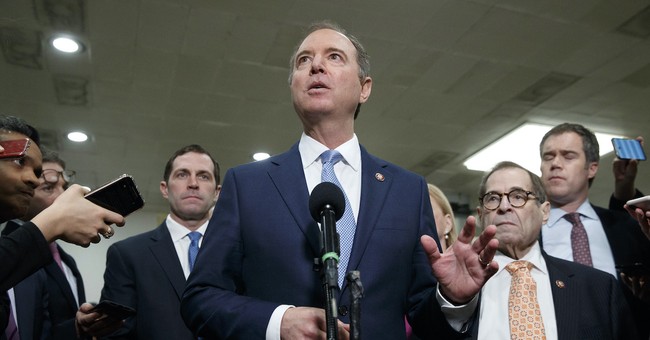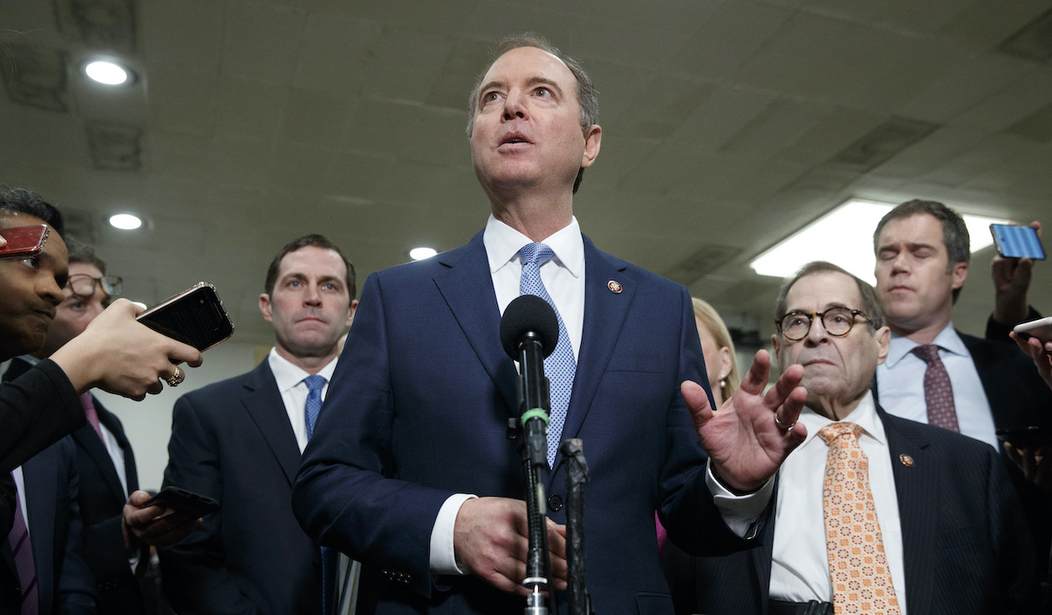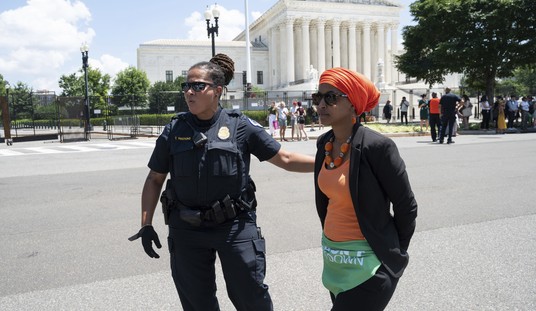
House Democratic impeachment managers including House Intelligence Committee Chairman Adam Schiff, D-Calif., center, with Rep. Jason Crow, D-Colo., left, and Judiciary Committee Chairman Jerrold Nadler, D-N.Y., speak to the media before attending the fourth day of the impeachment trial of President Donald Trump on charges of abuse of power and obstruction of Congress, Friday, Jan. 24, 2020, on Capitol Hill in Washington. (AP Photo/ Jacquelyn Martin)
What exactly is House Intelligence Committee Chairman Adam Schiff trying to hide? The California lawmaker recently moved to dismiss a lawsuit seeking the disclosure of secret subpoenas that he issued during the impeachment investigations last year.
The subpoenas were issued for phone records that Schiff made public during the investigation. The chairman’s legal team told the U.S. District Court for D.C. that “These requests and subpoenas were integral to the Committee’s inquiry and consistent with its mandate to investigate and issue a report” regarding whether President Donald Trump should be impeached.
In December, Judicial Watch, a conservative watchdog group, filed the lawsuit against Schiff and the committee to gain access to “the controversial subpoenas issued for phone records.” The chairman issued the subpoenas to obtain the phone records of several individuals close to Trump, including his lawyer, Rudy Giuliani. Judicial Watch noted that the chairman’s impeachment report included, “the publication of the private phone records of Giuliani, Congressman Devin Nunes, journalist John Solomon, Trump attorney Jay Sekulow, attorney Victoria Toensing, and other American citizens.”
Tom Fitton, the head of Judicial Watch, previously vowed to “push back in court,” to reveal Schiff’s “abuse of power.” Other Republicans have slammed the chairman for publicizing the phone records. Rep. Devin Nunes (R-CA), also referred to the move as a “gross abuse of power.”
In December, Fitton explained that “Schiff abused his power to secretly subpoena and then publish the private phone records, in potential violation of the law, of innocent Americans.” He also stated that the chairman “ran roughshod over the rule of law in pursuit of the abusive impeachment of President Trump.”
In their filing, Schiff’s attorneys argued that Judicial Watch “has not demonstrated that the public interest in disclosure outweighs that House Defendants’ interest in non-disclosure.”
Judicial Watch’s original lawsuit filing insisted that “the records are of critical public importance as the subpoenas were issued without any lawful basis and violated the rights of numerous private citizens.” The group also asserted “disclosure of the requested records would serve the public interest by providing information about the unlawful issuance of the subpoenas.”
Judicial Watch is not that only entity that wants the records revealed. Brendan Carr, who serves as an FCC commissioner, wrote a letter to the chairman expressing his concern over his conduct during the impeachment debacle. He urged for more scrutiny on the secret subpoenas and inquired as to whether or not Schiff is still looking at private records.
Schiff’s report on impeachment included at least 3,719 pages of records. The commissioner noted Section 222 of the Communications Act, which “prohibits any telecommunications carrier from releasing customer call records except as authorized by the customer or as required by law.” He also pointed out that “federal law has long protected the privacy and confidentiality of Americans’ call records.”
It seems odd that Schiff’s lawyers would argue that public interest pertaining to the secret subpoenas would not be significant enough to disclose the content of the documents. After all, if a ranking member of Congress potentially violated the law by gaining access to private phone records, wouldn’t this be an issue that the public deserves to know more about?
Perhaps the chairman is aware that he may have overstepped his boundaries. If Judicial Watch wins the lawsuit, the public might discover that Schiff engaged in behavior that was questionable — if not illegal. After all, it’s clear that the Democrats were intent on impeaching the president by any means necessary. Is it that much of a stretch to think that they engaged in unethical tactics to achieve their objective?
Let me know what you think in the comments below!
Follow me on Twitter: @JeffOnTheRight













Join the conversation as a VIP Member